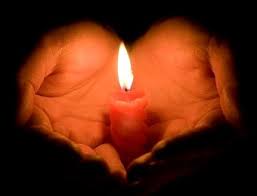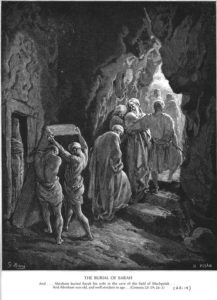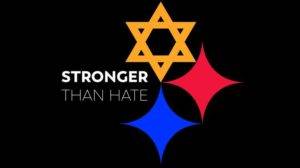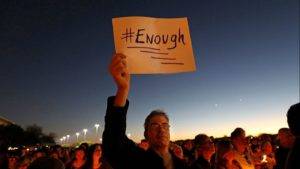If you can keep your head when all about you are losing theirs and blaming it on you…(If, by Rudyard Kipling)
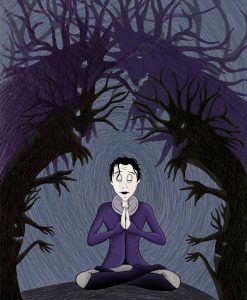
How do I handle competing demands? What do I require for myself, and what do my obligations to others require? This delicate balancing act requires profound self-knowledge based on the preparation that helps us reconcile the sometimes competing if not outright conflicting, needs. Aaron demonstrates how to navigate these tricky waters in Parshat Shemini.
We encounter this repeatedly in our life journey; the competing demands of work and family are familiar to all of us, and we often find we can do only one at the expense of the other. Which takes priority? Can they weave together? This is our dilemma.
The answer is grounded in self-understanding.
The Talmud often weaves its machloket (discussions) around understanding competing values, holding two things in tension, and understanding the core values under different circumstances. We study and learn about who we are, what grounds us, and what motivates us, sometimes creating a hierarchy placing specific values above others. Contemplating the question, “Who am I?” even in troubling circumstances, we maintain ourselves and do not get consumed by the events but move through them, as complicated as the test may be. That is Shemini.
The Eighth Day, Shemini, is momentous; Aaron is to be initiated as High Priest. But by singling out the eighth day, the Torah shows us that the seven days preceding it are also significant–they constitute the formative period that brings us to a critical moment and beyond.
Aaron and his sons underwent thorough planning to assume the priesthood. Moses remained High Priest until he was assured that the training was complete and Aaron and his sons were fully ready. And then, catastrophe.
Nadav and Abihu approached God with “alien fire” and were themselves consumed. We ask ourselves why, and we wrestle trying to understand. If the crime was drunkenness, as our texts and commentators suggest, the punishment of death seems extreme. Perhaps we are trying to explain the unexplainable.
The deaths of Nadav and Abihu may have been just that; a catastrophic event that seems capricious and arbitrary. Such things happen all the time. Therefore, the question is not why this happened but how we respond when disaster comes.
We cannot imagine the overwhelming shock and pain Aaron experienced, but we can conjure ideas of how we might respond. Break down in overwhelming grief, rail against God, fall on his face and rend his clothes, publicly grieve the loss of his sons, go off to be with them and bury them, and turn his back on the priesthood. The list goes on. But that is not what Aaron did.
Aaron remained silent, although shaken to his core at the brutal death of his two sons. The commentators struggle with this silence. As a father, his initial instinct would be to mourn his two sons’ loss immediately. Nachmanides, the 13th C. Sephardic commentator, suggests the silence came after he stopped crying. Rashbam, the 12th C. commentator from Northern France and Rashi’s grandson, explains that Moses intercedes, reminding Aaron he must continue the sacred service already underway, as Aaron was just invested as High Priest and charged with the well-being of the entire people.
Wisdom is usually considered the province of the elder. The hoary head of age is a badge indicating a lived life and the experiences of that life. But experiences are merely knowledge. Once we acquire knowledge, we must embrace it as a life lesson and part of our value system and then judiciously offer it to circumstances in the future; only then can we claim to possess wisdom. Aaron arguably attains wisdom. It is borne from a horrific experience and will guide him throughout the rest of his journey.
Our commentators focus on the verse that explains drunkenness. Rashi sees this as God speaking directly to Aaron, a reward for maintaining his comportment. I suggest it is Aaron comprehending the wisdom of priesthood and the particular responsibilities of that responsibility. This wisdom is for him and the others of the priestly class and as a model for the rest of us.
The people look to Aaron as an exemplar and intercessor with God. This unique stature required Aaron to maintain his composure and dignity, continuing his work in the face of this loss. However, Aaron does not participate in the offering and, in this separation, remains connected to his sons as a mourner.
We have all encountered the moment of decision. There are two paths forward, forcing us to choose the most critical. Although many of us could not comprehend how Aaron could continue his priestly duties, many of us understand there was no other way forward for him. Regardless, we must understand ourselves well enough to determine what we would do when faced with such a test.
Only through preparation or self-awareness can we know how to respond to crises, calamities, or even the everyday things that require tradeoffs. These are not the choices of good versus evil. They are the more nuanced choices, often of good versus good, that are more complex and difficult. How do we maintain who we are and uphold the values we hold dear if we have yet to explore either concept? Only through knowing one’s self can one authentically move forward.
Ironically, the verse from Deuteronomy (30.19) resonates in such complex space, “I call heaven and earth as witnesses today against you, I have set before you life and death, blessing and cursing; therefore, choose life, that both you and your descendants may live.” Therefore, we need to understand the meaning of choosing life. Indeed, even the unspeakable horror of losing a child still requires us to find a way forward in our lives and for others.
This is dynamic and constantly changing, yet, we continue to live and grow broadly from our experiences on this journey. Our self-understanding evolves, and wisdom permits us the opportunity to navigate a path forward.
The Ark in the Noah story is a craft beholden to wind, rain, and sea currents. It bobs on the water until it finally hits land. A sailboat, on the other hand, is different. Although it, too, is subject to the currents and constantly being pushed off course, it has rudder, keel, and sails. With these tools, the skilled and prepared pilot keeps the ship following the stars toward the intended destination. So too, can we as we grow older and wiser. We’ve prepared for the journey and its eventualities and can respond with that wisdom. This is the message of Shemini.

